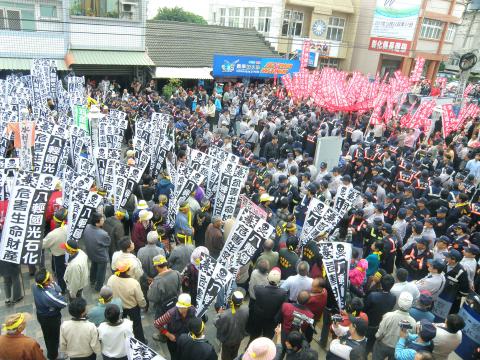Hundreds of supporters and opponents of a controversial plan to build a petrochemical complex in Changhua County clashed yesterday as the government held a public hearing on the project.
The two opposing forces used poles and protest banners to poke at each other outside Dacheng Township (大城) Hall in Changhua County in the hours before the hearing.
The clashes were sparked when a supporter of the project took exception to a fake coffin being held by opponents of the complex and tried to damage it.

PHOTO: LIU HSIAO-HSIN, TAIPEI TIMES
After they were separated by police, the two camps continued to trumpet their respective views via campaign trucks that were driven to the scene.
By the time the Ministry of Economic Affairs’ meeting on the NT$600 billion (US$20 billion) project began, the brawl had petered out, with no injuries reported.
Local police said between 400 and 500 protesters were present, while 500 officers were dispatched to the scene.
Inside the hall, sporadic quarrels also broke out between supporters and opponents of the project. The hearing ended without reaching any conclusion.
The complex is being proposed by Kuokuang Petrochemical Technology Co (KPTC, 國光石化科技), a joint venture between state-owned oil refiner CPC Corp, Taiwan (CPC, 台灣中油) and several private companies.
The project has been under consideration since the 1990s. Since it was first proposed, the site of the complex has been changed several times because of strong objections from local residents.
KPTC initially planned to invest up to NT$400 billion to construct a 4,000 hectare petrochemical complex on Changhua County’s coastal wetlands near the estuary of the Jhuoshui River (濁水溪). However, rising material costs increased the overall budget of the project.
The first phase is scheduled to be completed in 2016 and could help boost economic growth significantly, the project’s backers say.
The ministry says the project would generate revenue of about NT$460 billion and create 18,000 jobs directly and 357,000 jobs indirectly.
However, environmentalists have argued that the facility would cause irreversible damage to the area’s ecosystem, which includes migratory birds, fiddler crabs, mudskippers, mud shrimps and the endangered Indo-Pacific humpback dolphin.
Early last month, nearly 10,000 people from more than 200 groups nationwide took to the streets in Taipei, demanding that the government halt expansion of the petrochemical industry.

NATIONAL SECURITY THREAT: An official said that Guan Guan’s comments had gone beyond the threshold of free speech, as she advocated for the destruction of the ROC China-born media influencer Guan Guan’s (關關) residency permit has been revoked for repeatedly posting pro-China content that threatens national security, the National Immigration Agency said yesterday. Guan Guan has said many controversial things in her videos posted to Douyin (抖音), including “the red flag will soon be painted all over Taiwan” and “Taiwan is an inseparable part of China,” while expressing hope for expedited “reunification.” The agency received multiple reports alleging that Guan Guan had advocated for armed reunification last year. After investigating, the agency last month issued a notice requiring her to appear and account for her actions. Guan Guan appeared as required,

A Vietnamese migrant worker yesterday won NT$12 million (US$379,627) on a Lunar New Year scratch card in Kaohsiung as part of Taiwan Lottery Co’s (台灣彩券) “NT$12 Million Grand Fortune” (1200萬大吉利) game. The man was the first top-prize winner of the new game launched on Jan. 6 to mark the Lunar New Year. Three Vietnamese migrant workers visited a Taiwan Lottery shop on Xinyue Street in Kaohsiung’s Gangshan District (崗山), a store representative said. The player bought multiple tickets and, after winning nothing, held the final lottery ticket in one hand and rubbed the store’s statue of the Maitreya Buddha’s belly with the other,

‘NATO-PLUS’: ‘Our strategic partners in the Indo-Pacific are facing increasing aggression by the Chinese Communist Party,’ US Representative Rob Wittman said The US House of Representatives on Monday released its version of the Consolidated Appropriations Act, which includes US$1.15 billion to support security cooperation with Taiwan. The omnibus act, covering US$1.2 trillion of spending, allocates US$1 billion for the Taiwan Security Cooperation Initiative, as well as US$150 million for the replacement of defense articles and reimbursement of defense services provided to Taiwan. The fund allocations were based on the US National Defense Authorization Act for fiscal 2026 that was passed by the US Congress last month and authorized up to US$1 billion to the US Defense Security Cooperation Agency in support of the

CLASSIFIED BRIEFING: The ministry said the special budget focuses on building a comprehensive defense system and strengthening the domestic defense industry The Ministry of National Defense yesterday released information on seven categories of weapons systems to be procured under a stalled NT$1.25 trillion (US$39.57 billion) special defense budget, including precision artillery, long-range missiles, air defense anti-tank missiles and more than 200,000 uncrewed aerial vehicles (UAVs). The Executive Yuan approved a draft version of the budget on Nov. 27 last year and submitted it to the legislature for review. The legislature’s Foreign Affairs and National Defense Committee yesterday invited Minister of National Defense Wellington Koo (顧立雄) to deliver a classified briefing and answer questions at a closed-door session. Koo said he hoped to provide lawmakers